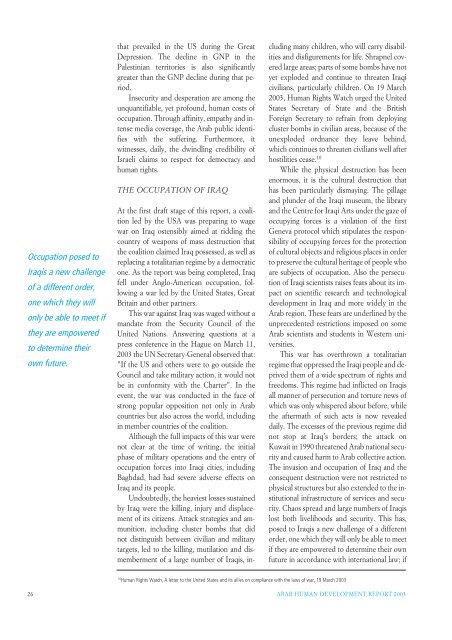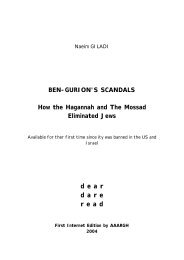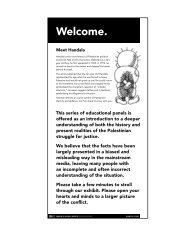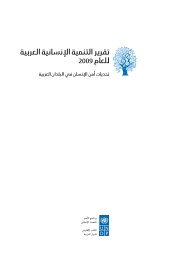a major <strong>human</strong>itarian crisis. They prevent accessto medical care and restrict the movementof medical personnel and supplies. Heart, cancerand renal patients cannot obtain treatmentor cannot afford it. Pregnant women are cutoff from antenatal care and are forced to givebirth at home or even at checkpoints. Fortythreewomen delivered babies at checkpoints,nine of whom were stillborn. 7 Parents cannothave their children immunised just as healthrisks are multiplying. Children and teacherscannot go to school. Malnutrition is rampantwith 30% of children under 5 suffering fromchronic malnutrition and 21% from acute malnutrition.8 Psychological trauma is widespread,particularly among children. Families,friends and communities find themselvesphysically isolated, unable to meet and supporteach other.While Israeli construction of settlementsand a separation barrier, "the wall", furthertightens Israel’s stranglehold on thePalestinian people, Israeli destruction ofPalestinian property and infrastructure undermineshope for a viable Palestinian economy.Between October 2000 and April 2002, physicaldamage amounted to US $ 305 million. Inmid-May 2002, after Israeli incursions intoseveral West Bank towns that left almost 260Palestinians dead, an international donor surveyassessed physical damage at more than US$361 million. 9 It was one of these incursions(into Jenin) that Terje Rød Larsen, UN SpecialCoordinator in the Occupied Territories describedas "horrific beyond belief" and"morally repugnant." His outcry and that ofthe international community did not restrainthe destruction. By September 2002 the damagehad nearly doubled to US $728 million.Israeli actions have deprived large segmentsof the population of job opportunitiesand income. GNP has been more than halvedand total income losses to the Palestinianeconomy are estimated to be between US $3.2and US $10 billion (in addition to the cost ofdestroyed public and private property). Aboutthree fourths of Palestinians are now living inpoverty (measured at under US $2 a day). TheBOX 7Human Losses in the Occupied Palestinian Territories(Sept 2001- April <strong>2003</strong>)• 2,405 dead, including 451 children and 265 students:- deaths by live ammunition: 1,455- by heavy weapons: 496- by assassination: 219• 41,000 wounded, including 7,000 children and 2,981 students.• 2,500 permanent disabilities, with 500 children affected.• 9 journalists killed, including 7 Palestinians. 75 journalists wounded167 journalists assaultedSources:- The <strong>Palestine</strong> Monitor: 28 September 2002 – 17 April <strong>2003</strong>)- Health, Development, Information, and Policy Institute- B’Tselem <strong>report</strong>: Illusions of restraint: Human Rights Violations During the Events in the Occupied Territories 29thSeptember - 2ndDecember, 2000- Palestinian Ministry of Health- UN Special Rapporteur of Commission on Human Rights, March 2002- Ministry of Education, 17 January 2002- General Union of Disabled Palestinians- UN Special Rapperteur of Communication Human Rights, March 2002- Information from the Palestinian Journalists SyndicateBOX 8Material Losses in the Occupied PalestinianTerritories in 19 months(until April <strong>2003</strong>)• Houses damaged: 11,553• Houses destroyed: 4,985• Schools destroyed: 323• Mosques destroyed: 30• Churches destroyed: 12• Wells destroyed: 134• Trees uprooted: 34,606• Land sequestrated: 1,162 donums*• Land Destroyed: 17,162 donumsSource: The <strong>Palestine</strong> Monitor- Palestinian Centre for Human Rights, 3rd June, 2002- Palestinian Humanitarian Disaster, U.S. Agency for International Development, July 10, 2002- Ministry of Education, 17 Jan 2002, Information for Ministry of Education schools- Palestinian Council for Justice and Peace- Al-Mezan 2001- LAW Society, 29th Nov 2001 (figure from beginning of 2000)*A donum is 1,000 sq. m. of land.number of poor people has tripled sinceSeptember 2000. Two thirds of the workforcein Gaza, and half of the workforce in the WestBank, are unemployed. Palestinians are nowmore dependent on food aid than ever before.The World Bank estimates that if the conflictis resolved and the closure lifted, it will stilltake at least two years for the Palestinian economyto restore pre-September 2000 per capitaincome.Current unemployment rates in the WestBank and Gaza are more than double thoseAbout three fourths ofPalestinians are nowliving in povertymeasured at under US$2 a day.7The Palestinian Red Crescent Society (PRCS)8Report by the US Agency for International Development (USAID) and Johns Hopkins University, 20029Physical and Institutional Damage Assessment – West Bank Governorates, March-May, 2002 by the Donor Support Group, Local Aid CoordinationCommittee, May 2002PART ONE: CHANGES IN HUMAN DEVELOPMENT IN ARAB COUNTRIES DURING 2001-2002 25
Occupation posed toIraqis a new challengeof a different order,one which they willonly be able to meet ifthey are empoweredto determine theirown future.that prevailed in the US during the GreatDepression. The decline in GNP in thePalestinian territories is also significantlygreater than the GNP decline during that period.Insecurity and desperation are among theunquantifiable, yet profound, <strong>human</strong> costs ofoccupation. Through affinity, empathy and intensemedia coverage, the Arab public identifieswith the suffering. Furthermore, itwitnesses, daily, the dwindling credibility ofIsraeli claims to respect for democracy and<strong>human</strong> rights.THE OCCUPATION OF IRAQAt the first draft stage of this <strong>report</strong>, a coalitionled by the USA was preparing to wagewar on Iraq ostensibly aimed at ridding thecountry of weapons of mass destruction thatthe coalition claimed Iraq possessed, as well asreplacing a totalitarian regime by a democraticone. As the <strong>report</strong> was being completed, Iraqfell under Anglo-American occupation, followinga war led by the United States, GreatBritain and other partners.This war against Iraq was waged without amandate from the Security Council of theUnited Nations. Answering questions at apress conference in the Hague on March 11,<strong>2003</strong> the UN Secretary-General observed that:"If the US and others were to go outside theCouncil and take military action, it would notbe in conformity with the Charter". In theevent, the war was conducted in the face ofstrong popular opposition not only in Arabcountries but also across the world, includingin member countries of the coalition.Although the full impacts of this war werenot clear at the time of writing, the initialphase of military operations and the entry ofoccupation forces into Iraqi cities, includingBaghdad, had had severe adverse effects onIraq and its people.Undoubtedly, the heaviest losses sustainedby Iraq were the killing, injury and displacementof its citizens. Attack strategies and ammunition,including cluster bombs that didnot distinguish between civilian and militarytargets, led to the killing, mutilation and dismembermentof a large number of Iraqis, includingmany children, who will carry disabilitiesand disfigurements for life. Shrapnel coveredlarge areas; parts of some bombs have notyet exploded and continue to threaten Iraqicivilians, particularly children. On 19 March<strong>2003</strong>, Human Rights Watch urged the UnitedStates Secretary of State and the BritishForeign Secretary to refrain from deployingcluster bombs in civilian areas, because of theunexploded ordnance they leave behind,which continues to threaten civilians well afterhostilities cease. 10While the physical destruction has beenenormous, it is the cultural destruction thathas been particularly dismaying. The pillageand plunder of the Iraqi museum, the libraryand the Centre for Iraqi Arts under the gaze ofoccupying forces is a violation of the firstGeneva protocol which stipulates the responsibilityof occupying forces for the protectionof cultural objects and religious places in orderto preserve the cultural heritage of people whoare subjects of occupation. Also the persecutionof Iraqi scientists raises fears about its impacton scientific research and technological<strong>development</strong> in Iraq and more widely in theArab region. These fears are underlined by theunprecedented restrictions imposed on someArab scientists and students in Western universities.This war has overthrown a totalitarianregime that oppressed the Iraqi people and deprivedthem of a wide spectrum of rights andfreedoms. This regime had inflicted on Iraqisall manner of persecution and torture news ofwhich was only whispered about before, whilethe aftermath of such acts is now revealeddaily. The excesses of the previous regime didnot stop at Iraq’s borders; the attack onKuwait in 1990 threatened Arab national securityand caused harm to Arab collective action.The invasion and occupation of Iraq and theconsequent destruction were not restricted tophysical structures but also extended to the institutionalinfrastructure of services and security.Chaos spread and large numbers of Iraqislost both livelihoods and security. This has,posed to Iraqis a new challenge of a differentorder, one which they will only be able to meetif they are empowered to determine their ownfuture in accordance with international law; if10Human Rights Watch, A letter to the United States and its allies on compliance with the laws of war, 19 March <strong>2003</strong>26 ARAB HUMAN DEVELOPMENT REPORT <strong>2003</strong>
- Page 2 and 3: United Nations Development Programm
- Page 5 and 6: Immersion, yes, but swamped or drow
- Page 7 and 8: level of development, help all its
- Page 9 and 10: interrelated issues in some depth.
- Page 11: ABBREVIATIONS AND ACRONYMSAFTAAHDIA
- Page 14 and 15: The Arab knowledge civilisation: so
- Page 16 and 17: Cultural interaction129CHAPTER 7SOC
- Page 18 and 19: 7.1 Patriarchal Society in Arab Cou
- Page 20 and 21: EXECUTIVE SUMMARYThe first Arab Hum
- Page 22 and 23: nowadays can provide the means to e
- Page 24 and 25: presence of significant human capit
- Page 26 and 27: movements with an Islamic mark unde
- Page 29 and 30: Arab citizens areincreasingly pushe
- Page 31 and 32: Constitutions, lawsand administrati
- Page 33 and 34: PART IChanges in human development
- Page 35 and 36: The challenge ofbuilding humandevel
- Page 37 and 38: The AHDR was a bellthat rang at the
- Page 39 and 40: Governments, statingconsiderations
- Page 41: BOX 6Human Rights Watch Report 2002
- Page 45 and 46: Arab countries, onaverage, continue
- Page 47 and 48: In most Arab countriesthe march of
- Page 49 and 50: The core challenges tohuman develop
- Page 51 and 52: CHAPTER 1Conceptual framework: know
- Page 53 and 54: level of society, between knowledge
- Page 55 and 56: it. As such, the returns to knowled
- Page 57 and 58: knowledge vary and interact, especi
- Page 59 and 60: of calculation systems and the util
- Page 61 and 62: BOX 1.5Ahmad Kamal Aboulmagd: Towar
- Page 63 and 64: Figure 1.4PC availability and Inter
- Page 65 and 66: PART IISection two: the state of kn
- Page 67 and 68: The most seriousproblem facing Arab
- Page 69 and 70: Communication ineducation is didact
- Page 71 and 72: One of the mainfeatures of manyuniv
- Page 73 and 74: The evaluation indicates that priva
- Page 75 and 76: Official Arab satellitechannels dom
- Page 77 and 78: The harassment ofthe press under th
- Page 79 and 80: Figure 2.7Personal computers: Arab
- Page 81 and 82: There is clearly alarger role for t
- Page 83 and 84: ooks for translation in order to fu
- Page 85 and 86: Arabic research activitycontinues t
- Page 87 and 88: Workers in scientific research andd
- Page 89 and 90: TABLE 3.3Number of scientific resea
- Page 91 and 92: Restricting intellectualfreedom is
- Page 93 and 94:
Figure 3.3Number of publications -
- Page 95 and 96:
when economic crises and security c
- Page 97 and 98:
The main threat to freeliterature a
- Page 99 and 100:
CHAPTER 4Measuring knowledge capita
- Page 101 and 102:
noted, the current attempt to measu
- Page 103 and 104:
esearch and development and arts pr
- Page 105 and 106:
velopment. Does the disparity in hu
- Page 107 and 108:
ple)7. Book titles (per million peo
- Page 109 and 110:
Despite the methodological and othe
- Page 111 and 112:
Figure 5.1:Actors and linkages in t
- Page 113 and 114:
Industrial R&Dinstitutions are weak
- Page 115 and 116:
Until Arab countriesdevelop andseam
- Page 117 and 118:
Governments havelarge responsibilit
- Page 119 and 120:
sibilities of information and commu
- Page 121 and 122:
Joint Euro-Arab R&Dactivities in th
- Page 123 and 124:
PART IISection three: the cultural,
- Page 125 and 126:
The issue of Arabintellectual herit
- Page 127 and 128:
The Arab mentality (is)a system tha
- Page 129 and 130:
Heritage has been adynamic contribu
- Page 131 and 132:
BOX 6.3Al Kawakibi (1854-1902) Desp
- Page 133 and 134:
The Arabic language isthe distincti
- Page 135 and 136:
BOX 6.8Arab North Africa - Language
- Page 137 and 138:
The re-birth of theArabic language
- Page 139 and 140:
Traditionaloccupations and craftsar
- Page 141 and 142:
Arab contemporaryculture is general
- Page 143 and 144:
CHAPTER 7Socio-economic structureTh
- Page 145 and 146:
tivities.The first consequence of t
- Page 147 and 148:
also narrowed markets. Yet it is wo
- Page 149 and 150:
The volume of Arab capital invested
- Page 151 and 152:
BOX 7.1Patriarchal Society in Arab
- Page 153 and 154:
amid the contraction of domestic ec
- Page 155 and 156:
knowledge societies in Arab countri
- Page 157 and 158:
The isolation ofcultural elites has
- Page 159 and 160:
The goal should be toinstitutionali
- Page 161 and 162:
BOX 8.3Imam Muhammad Abduh(1849-190
- Page 163 and 164:
Penalties meted out tojournalists,
- Page 165 and 166:
Disregard forintellectual propertyp
- Page 167 and 168:
Concerns that theworld economicsyst
- Page 169 and 170:
BOX 8.6Trade and Development: Prebi
- Page 171 and 172:
CHAPTER 9A strategic vision: the fi
- Page 173 and 174:
1. UNLEASHING ANDGUARANTEEING THE K
- Page 175 and 176:
certed efforts of the state, civil
- Page 177 and 178:
programmes of higher education inst
- Page 179 and 180:
also initiate innovation: it could
- Page 181 and 182:
BOX 9.4Imams (religious leaders) ad
- Page 183 and 184:
cially useful in the production of
- Page 185 and 186:
just one external point of referenc
- Page 187 and 188:
ReferencesEnglish ReferencesAmnesty
- Page 189 and 190:
Egyptian Sociology". National Centr
- Page 191 and 192:
Maalouf, Amin, 2001.In the Name of
- Page 193 and 194:
Fasl Al-Makal fi Taqrir ma bain Al-
- Page 195 and 196:
Clovis Maksoud, Introduction to the
- Page 197 and 198:
Elements of opinion survey of Arab
- Page 199 and 200:
Table A-1NET ENROLMENT RATIOS (%) I
- Page 201 and 202:
Table A-5PUPILS PER TEACHER RATIO B
- Page 203 and 204:
Table A-9RELATIVE DISTRIBUTION OF T
- Page 205 and 206:
198 ARAB HUMAN DEVELOPMENT REPORT 2
- Page 207 and 208:
Table A-10VALUES OF INDICATORS ON K
- Page 209 and 210:
202 ARAB HUMAN DEVELOPMENT REPORT 2
- Page 211 and 212:
204 ARAB HUMAN DEVELOPMENT REPORT 2
- Page 213 and 214:
206 ARAB HUMAN DEVELOPMENT REPORT 2
- Page 215 and 216:
208 ARAB HUMAN DEVELOPMENT REPORT 2
- Page 217:
Table A-13VALUES OF KNOWLEDGE OUTCO







